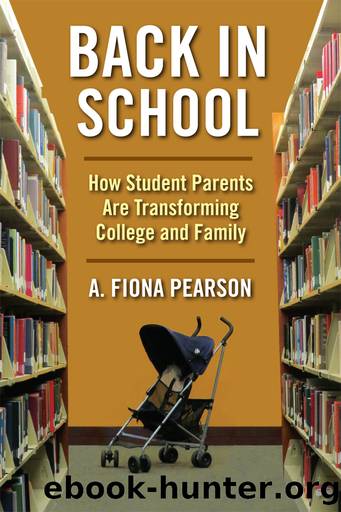Back in School by Pearson A. Fiona;

Author:Pearson, A. Fiona;
Language: eng
Format: epub
Publisher: Rutgers University Press
Of the three typologies of student parents described in this chapter, those students who are most likely to be disenchanted with their college experiences and classroom learning are the job seekers. The job seekers in this study value the degree they intend to acquire but often question the value of their college learning experiences, particularly those experiences that they do not see as being directly related to their anticipated jobs. As a result, they are less connected to their student identities than are both the practical explorers and self-reflective learners. The hope that job seekers will graduate is no doubt diminished by the fact that they are less intellectually engaged in many of their classes than are their peers.3 Further, given the relatively large number of job seekers in this study who are single parents and whose low incomes result in their being eligible for and receiving Pell Grants, we ought to be highly concerned about their educational futures as a result of their more precarious social and economic contexts. Low-income students have the most to lose in regard to socioeconomic status if they should either not complete their education or see their educational credentials go unrewarded in an economy in which middle-class jobs are steadily dwindling (McMillan Cottom 2017; Mettler 2014).
Some of these job seekers will indeed graduate and locate positions that provide a viable income and economic mobility, in part due to the familial and social resources that are helping them to navigate college life. Even though Ed, a job seeker, primarily views his college education as consisting of a series of requirements to âget through,â he understands that he needs to do well in all his classes. He is a good student whose college-educated family members support his educational goals, especially his father, who teaches adjunct classes at the university that Ed is attending and can therefore help him to search out and make use of campus supports and offices when necessary. Ed also credits his military experience as providing him with the discipline to forge through classes that he might not enjoy but that he feels are necessary to complete to achieve his long-term goals. Further, the military provides him with tuition waivers and a living stipend, so he feels he can afford his education at this particular time in his life. With all of these resources available to him, Ed can focus on his educational goals and hopes that the skills that he acquires in his computer information technology classes will aid him in landing a job in the burgeoning field of network security.
However, as I also describe in this chapter, another job seeker, Jackie, is struggling in many of her classes, and her goal of being accepted into her universityâs education program and eventually becoming a teacher is not looking likely. Jackieâs parents do not possess college degrees, and although they express support for their childrenâs educational goals, they have few experiences of their own to draw upon when providing guidance to them in regard to their college education (Rondini 2016).
Download
This site does not store any files on its server. We only index and link to content provided by other sites. Please contact the content providers to delete copyright contents if any and email us, we'll remove relevant links or contents immediately.
The Art of Coaching Workbook by Elena Aguilar(48572)
Trainspotting by Irvine Welsh(20140)
Twilight of the Idols With the Antichrist and Ecce Homo by Friedrich Nietzsche(17754)
Fangirl by Rainbow Rowell(7893)
Periodization Training for Sports by Tudor Bompa(7376)
Change Your Questions, Change Your Life by Marilee Adams(6702)
This Is How You Lose Her by Junot Diaz(5845)
Grit by Angela Duckworth(4778)
Red Sparrow by Jason Matthews(4734)
Asking the Right Questions: A Guide to Critical Thinking by M. Neil Browne & Stuart M. Keeley(4642)
Paper Towns by Green John(4209)
Room 212 by Kate Stewart(4152)
Ken Follett - World without end by Ken Follett(4003)
The Sports Rules Book by Human Kinetics(3630)
Housekeeping by Marilynne Robinson(3456)
The Motorcycle Diaries by Ernesto Che Guevara(3380)
Introduction to Kinesiology by Shirl J. Hoffman(3329)
Exercise Technique Manual for Resistance Training by National Strength & Conditioning Association(3329)
Papillon (English) by Henri Charrière(3324)
